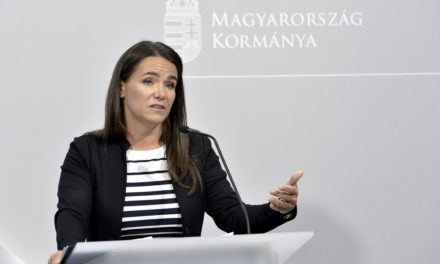I was deeply impressed by the Hungarian measures and the country's results - Polish Minister of Family Affairs Marlena Maląg emphasized in an interview with Magyar Hírlap about the driving forces and results of Polish family policy.
"Each country has the right to deal with demographic challenges as it sees fit, as long as it does not impose it on others," said Polish Minister of Family and Social Affairs Marlena Maląg, referring to Western European countries' choice of immigration.
- Why does the Polish government place a lot of emphasis on family policy?
- The family-friendly policy has been one of the most important priorities of the Polish government for five years. The family is the pillar of society, the first community in the history of mankind that appeared even before the formation of statehood. In centuries, no better environment for giving birth and raising a child has developed. The family offers the most valuable gift possible: new citizens. Without the family, the development of our society would not be possible. In the family and thanks to the family, we can satisfy our most important human needs, including: security, belonging, respect, recognition or self-realization.
In the family, we learn love, generosity, selflessness. The family surrounds us with protection and concern. In the family, we receive the love that allows us to live happily and that gives us the strength to overcome everyday difficulties. How important family is can be perfectly observed even during the pandemic, when our lives were limited to our homes. Most of us would not have survived this time without the family, which became our protection, support and shelter during this extremely difficult time. That is why for the Polish government, the family is a treasure that must be protected.
– Is family policy a central issue under the Polish presidency of the Visegrád group?
- The family is an equally important value for all four countries of the V4, investing in the family is investing in the future. This is why the discussion on providing the most optimal conditions for the family was crucial at the conference organized within the framework of the Polish presidency in February this year. We will expand on this question and dive into the debate during the international conference, which will be held this May. It is not only the debate that is important to us, but also the creation of a joint initiative focused on the family that can be continued in the coming years.
– What is your opinion about Hungarian family protection measures? What cooperation opportunities are there? Do they adopt good practices from each other?
- I was deeply impressed by the measures taken in the framework of the family-friendly policy and what Hungary has achieved so far in this area. I admire not only the courage with which they undertook further initiatives, not only the unity and consistency of their actions, but what is crucial, the impact that the changes bring. I believe that the exchange of experience between our countries in this form is not overrated, as it is worthwhile to use proven solutions.
At the last meeting of the ministers responsible for the family of the countries of the Visegrád group, they therefore decided to set up a working group to observe in detail the individual elements of the family-friendly policies of these countries, including, of course, Hungary's. We would like to examine, among other things, whether some of these can be introduced in Poland. Of particular interest to us is the solution that had an impact on the increase in the number of marriages and the decrease in divorces in Hungary. The protection of marriage is an immeasurably important part of a family-friendly policy.
– What are the main Polish demographic measures?
– Our government is taking a number of unprecedented steps in the direction of improving demographic indicators, especially with regard to starting a family. These steps affect more the labor market (for example, the systematic increase of the minimum wage) or the housing market, among them is the Housing Plusz Program, which provides families with stable housing conditions without a large mortgage loan. Tax benefits for families with children and families with three or more children also apply.
The discount system for services and products is the so-called Big Family Card. However, special attention should be paid to social programs, including the largest social government program operating since April 2016, Family Five Hundred Plus, under which parents receive five hundred zlotys per month for each child. At the same time, there is the Good Start program, within the framework of which an allowance of three hundred zlotys is paid once a year for each student until they reach the age of twenty. In addition, the Pöttöm Plusz Program aimed at local governments was implemented, which doubled the nursery education rate in five years.
– How effective are these measures?
- Since the coalition of the united right has been in power for six years, family policy expenses have doubled. Among other things, this is the reason why the fertility rate in Poland has increased. The number of those who would like to have one child is decreasing, but the number of those who want three children is increasing. Only two percent of Poles do not want to have children.
- Poland is under a lot of attacks regarding the LGBT (lesbian, gay, bisexual, transgender) community. How do you see this issue from the point of view of family protection?
- In Poland, we respect all people, regardless of origin, religion, skin color, gender or sexual orientation. Tolerance is deeply rooted in our history. Thanks to King Kazmér the Great, Poland became the first multi-religious country in medieval Europe. The sixteenth-century Sejm passed a resolution known as the Warsaw Confederation, legally guaranteeing religious freedom. In the era of religious wars, this was a pioneering attitude, and this document was added to the UNESCO World Heritage list.
Throughout history, we have proven our need for freedom countless times, including individual freedom. Respecting the freedom of every Pole is very important to us. The same is true for LGBT people. This is also confirmed by the OSCE report, according to which sixteen hate crimes were committed against LGBT people in Poland in 2019, compared to, for example, five hundred and seventy-four in the Netherlands, two hundred and seventy-eight in Spain, and two hundred and forty-eight in Germany.
– What about the alleged LGBT-free zones?
- There is no so-called LGBT-free zone in Poland, as they claim. It was the movement of a single activist when he attached a sign saying LGBT-free zone to a place name sign, then photographed it and made it public. As a result, the false information that such places exist in Poland has spread. Unlike other countries, Polish law has never punished homosexuality.
Our constitution stated that the Republic of Poland protects marriage as the union of a man and a woman, as well as the family, motherhood and fatherhood. This obliges our government to take special measures for the benefit of the family, this is our priority. At the same time, any measures taken in favor of families, which our constitution obliges us to do, cannot be applied against someone else. It would take extreme malice to see it that way.
– What is your opinion about the fact that several countries in Europe want to deal with demographic problems with immigration?
- Every country has the right to deal with demographic challenges as it sees fit, as long as it does not impose it on others. According to data from two years ago, half of the two million foreigners living in Poland are Ukrainians, and the second largest group is Belarusians. Nevertheless, this is not our response to demographic challenges, but rather a kind of openness towards neighboring countries experiencing current difficulties and crises.
Our answer to the demographic challenges is a complex, unified, continuously implemented family-friendly policy. We are also planning to announce the demographic strategy soon. However, it must be taken into account that demography is a long-term process. You cannot make up for thirty neglected years in five years. The fruits of our steps today can only be reaped after a generational change at the earliest, that is, after about thirty years.
Source: magyarhirlap.hu
Photo: Photo: Polish Ministry of Family and Social Affairs













